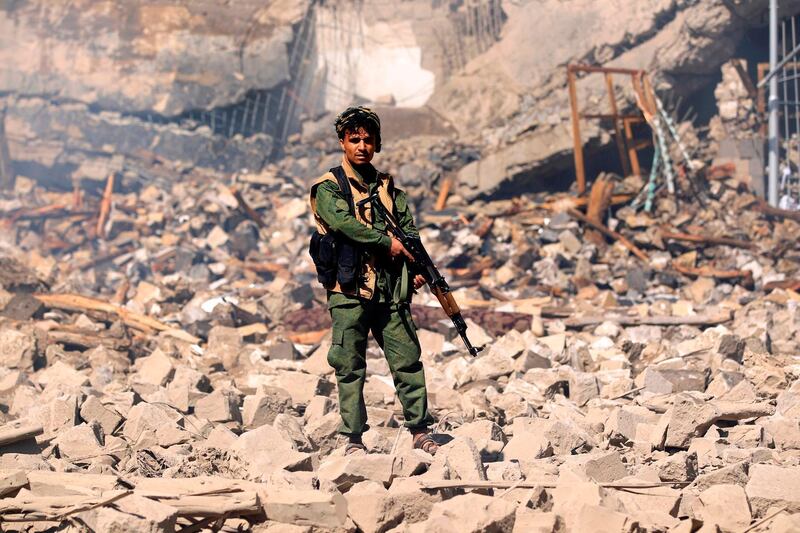The death of Ali Abdullah Saleh has shocked Yemenis and even seasoned observers of the eclectic, fascinating, frustrating country. Few expected him to die, especially during this particular twist in Yemen's latest war. Numerous attempts had been made on his life – most recently in 2012, when an assassination attempt killed people standing right beside him, yet left him injured but alive – and somehow, Saleh managed to scrape through them all.
Yet in Yemen, there was little time to digest the news, let alone mourn or celebrate. The battle for Sanaa began almost immediately and shows no sign of stopping soon. For Saleh to die at such a critical moment, just as he turned his forces on the Houthi rebels and the Yemeni government forces appeared to back him, leaves the country at the very edge of a precipice. With his death, hopes of a swift resolution to this crisis have been extinguished.
That makes the death of Ali Abdullah Saleh a bad moment for Yemen; the country will be worse off without him, at least in the short term. Many will be shocked to read that: Saleh, after all, had been the instigator of this most recent, and most devastating, twist in the national story of Yemen. It is because of his intransigence and his desire for power that millions in the country are without electricity, without medicine, without food or shelter. More than any other single person, he bears responsibility for the situation of Yemen today.
And yet the latest twist was almost a positive one. The efforts of the international community to reinstate the president Abdrabu Mansur Hadi in Sanaa have been deadlocked. The Houthis, backed by Saleh loyalists, have proven tenacious fighters, digging in even as air strikes destroyed their ranks.
Saleh himself refused to budge and abandon the Houthis until – as he said in what turned out to be his last interview over the weekend – he felt the coalition had had "enough". By turning on the Houthis, Saleh offered the only way out of the impasse. Splitting Saleh from the Houthis represented the only political solution to turning the tide of the conflict without the military solution of a full-scale assault on Sanaa. He knew it and the coalition knew it, which is why they spent months trying to bring it about. Had it succeeded, Yemen could have been stabilised, something that Yemenis themselves are crying out for, regardless of the political price.
Few in the international community will mourn Saleh. Many Yemenis, inside and outside the country, have suffered because of his policies.
Had he died in the assassination attempt of 2012, when burns and broken bones forced him to Saudi Arabia for treatment, it is possible the country would have turned a page, since by then he was established in the public mind as a villain, a president who had long outstayed his welcome.
But in the five years since, he had fought himself back to relevance and, at least in certain parts of the population, there was an acceptance, if a grudging one, that Saleh remained the only man who could stabilise the country.
With him gone, there will be a desperate scramble to succeed him, and that scramble will be played out on the streets of Yemen’s capital. The first battles will be fought against the Houthis, to remove them from the capital; the second among his loyalists, rivals and family members, for the right to claim his legacy.
Even in Saada, the northern seat of Houthi power, there must be a realisation that killing him was a mistake. In the grainy, noisy video of his death, Houthi fighters can be heard shouting “we have avenged you, Hussein”, a reference to Hussein Baddreddin Al Houthi, the founder of the movement and father of the current leader, who was killed more than a decade ago on Saleh's orders.
Yet any celebration of this revenge will be shortlived. The Houthis are not yet skilled politicians. The smartest move they made was in February 2015, shortly after taking over the capital, when they sought to form a transitional authority to govern the country – in essence, allowing them to step back and control the government from behind the scenes. That backfired and precipitated the move of Mr Hadi's government to Aden. The international community will be watching for any similar attempt.
And therein lies the Houthi's problem. Strip away the talk about “our precious Yemeni brothers” that Abdel Malik Al Houthi used in his televised address announcing the death of Saleh, and the group is, in the end, a rather unknown group of fighters with heterodox religious beliefs from a small province in the far north of Yemen. Their best hope of acceptance by the political and merchant elite of Sanaa, without the continued use of force, were as partners to Saleh. With him gone, and at their hands as well, blame for the conflict will fall squarely on their shoulders. Public opinion in the north will shift, starting in the capital.
Indeed, the Houthis themselves may have realised this. Rarely a placatory figure, Abdel Malik Al Houthi sounded a note of conciliation in his address, saying that Saleh’s party would not be targeted. At the same time, the group has called for public celebrations of Saleh’s death, no doubt to offset any possible public designation of Saleh as a “martyr”.
Even in death, Saleh is bringing pain to Yemen. It is the tragedy of Yemen that, by passing at this moment, he will bring the country more pain dead than alive.





